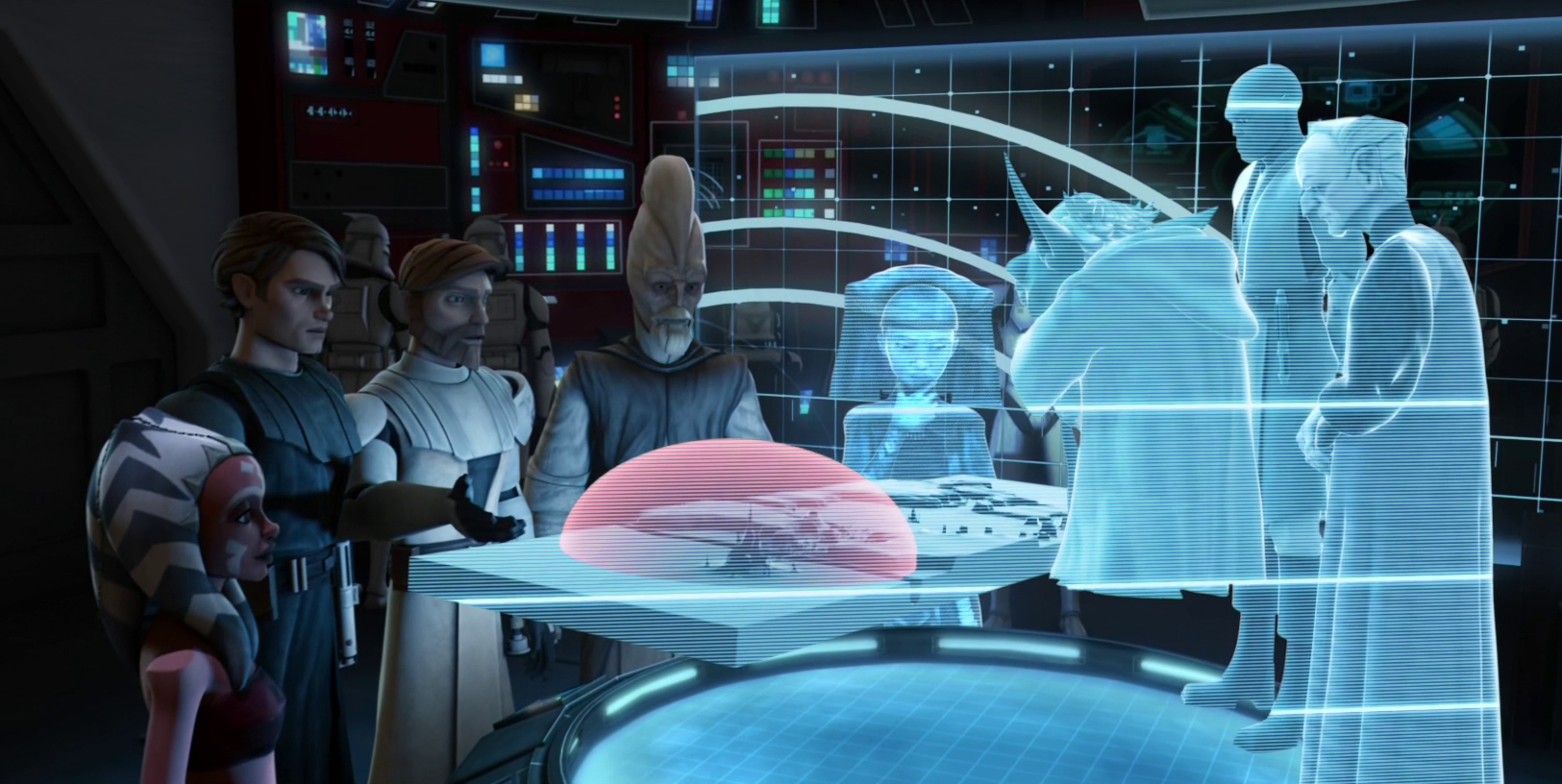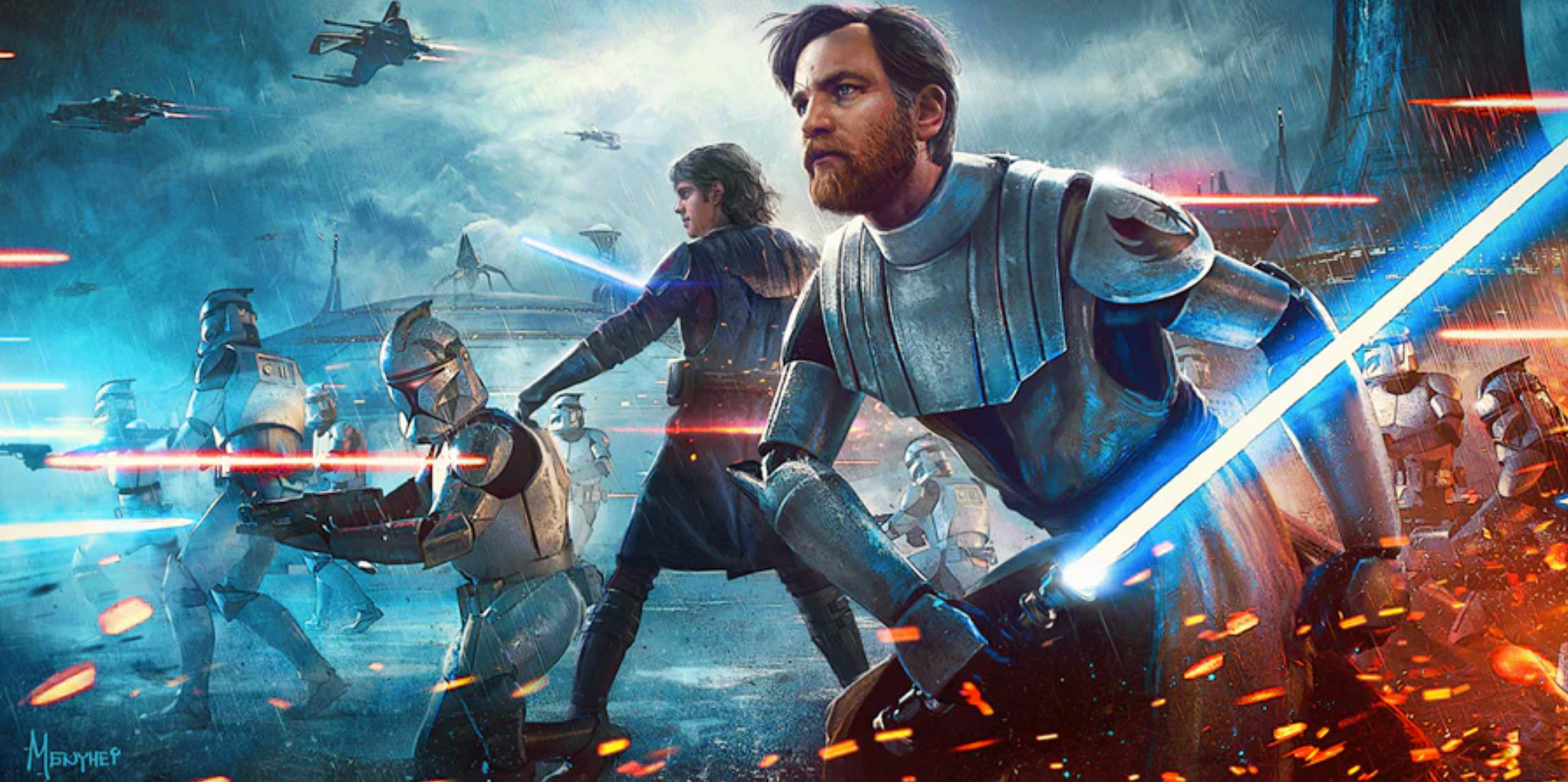Jedi Generals were high-ranking Jedi military officers in the Grand Army of the Republic. Originally informal, the title was officially created in 22 BBY shortly into the Clone Wars, being reserved for Jedi Knights, Jedi Masters, and the Jedi High Council—the governing body of the Jedi Order. As generals, the Jedi were responsible for leading the Galactic Republic's clone trooper army against the forces of the Confederacy of Independent Systems.
By 19 BBY, the Jedi were spread thin across the galaxy. As the war drew to a close, Supreme Chancellor Sheev Palpatine ordered the clone army to initiate Order 66—a military protocol authorizing the annihilation of the Jedi Order, which the clone troopers were programmed to obey without question. As a result, many unsuspecting Jedi generals were summarily executed by their own soldiers, although a few survivors managed to escape into exile, such as Obi-Wan Kenobi and Grand Master Yoda.
Having liquidated most of the Grand Army's Jedi officers, Palpatine—whose secret identity was Darth Sidious, the Dark Lord of the Sith—declared himself Emperor of the Galactic Empire. Anakin Skywalker, a Jedi General who turned to the dark side of the Force, became the Emperor's apprentice and enforcer, and assumed the identity of Darth Vader.

Jedi Generals provided leadership to the Grand Army of the Republic and coordinated strategy with the Supreme Chancellor.
Under the Jedi Military Integration Act, the rank of general provided the Jedi with the authority to lead the Grand Army of the Republic. A Jedi general was the commanding officer of a battalion of clone troopers—elite soldiers cloned from the template of Jango Fett and conditioned to follow orders with absolute obedience. As generals, the Jedi had various wartime responsibilities such as leading troops on the battlefield or coordinating strategy with the Supreme Chancellor of the Galactic Republic. Jedi Generals also dealt with mundane administrative decisions regarding staffing, equipment and resupply, promotions and training, and even budget requests. As the governing body of the Jedi Order, the Jedi High Council directed the Jedi in their role as military leaders. However, the High Council could also make forays onto the battlefield, serving alongside their troopers as Jedi Master Mace Windu demonstrated during the campaign to liberate Ryloth.
The clone troopers were subject to the authority of their Jedi Generals. They were loyal to the Jedi and the Republic, although there were instances of disobedience among the rank-and-file. In such cases a Jedi could exercise their authority as a general by ordering the arrest and court-martial of an offending clone. If the offense was treason, it was within the general's authority to have the prisoner summarily executed. The execution could be carried out either by a firing squad or the general.
Throughout its history, the members of the Jedi Order resolved to never become warriors, instead hoping to merely remain keepers of galactic peace despite their close ties to the Galactic Republic. As the Nihil conflict dragged on during the High Republic Era, the Jedi grew increasingly close with the Republic at the government's urging. Although the Jedi would fight alongside and lead the Republic Defense Coalition and Galactic Republic troopers in the name of destroying the Nihil marauder threat, Jedi Master Stellan Gios made it clear to Supreme Chancellor Lina Soh that the Jedi were not going to become her soldiers. All the same, the Outer Rim Territories were effectively consumed by war over the course of the Nihil conflict, which many Jedi had trouble adjusting to. The advent of the Clone Wars over two centuries later threatened the Order's position as peacekeepers.

Under the Jedi Military Integration Act, Jedi Knights and Masters served as generals of the Grand Army of the Republic.
During the First Battle of Geonosis in 22 BBY, the Jedi did not hold a military rank in the newly-formed Grand Army of the Republic. Despite this, high-ranking Jedi acted as de facto generals, commanding more than 80 regiments of clone troopers. Under the Jedi High Council's skillful leadership, the clone army was able to achieve both air and ground supremacy against the forces of the Confederacy of Independent Systems. Following their victory on Geonosis, the Jedi Order's role in the Republic's military forces remained in effect, with Jedi Masters and Jedi Knights acting as high ranking officers, but their position was remained informal. The term "general" emerged as an informal designation from the clones, who felt confused about the Jedi's role in military affairs. The title was respected by other Republic officials. Several weeks into the Clone Wars, the Jedi Military Integration Act was passed, which officially made Knights and Masters into holders of a formal rank, Jedi General, while Padawans were made into Jedi Commanders.
Throughout the Clone Wars, the Jedi generals commanded the loyalty of the clone troopers who followed them into battle across the galaxy. By the war's end, however, the clones turned against the Jedi and executed them as enemies of the state in accordance with Order 66—a military protocol that authorized the liquidation of the entire Jedi Order. Unknown to the clones, secret behavioral modification biochips had been designed and integrated into them to compel them to follow Order 66 without hesitation as part of a Sith plot to destroy the Jedi and gain control of the galaxy. Although the generals Yoda, Quinlan Vos, Oppo Rancisis, and Obi-Wan Kenobi survived the initial purge, the Sith Lord Darth Sidious proclaimed himself Emperor of the Galactic Empire in the wake of the Jedi Order's fall in 19 BBY.

By the end of the Clone Wars, the Jedi Generals were executed by their clone troopers under Order 66.
After decades in exile, Kenobi was sought out by Princess Leia Organa. Knowing of the former Jedi general's service in the Clone Wars through her adoptive father, Bail Organa, she delivered a message imploring General Kenobi to help the Alliance to Restore the Republic in their struggle against the Empire. Ultimately, both Kenobi and Yoda aided the Alliance by serving as a mentor, in turn, to the aspiring Jedi Luke Skywalker—son of the fallen Jedi General Anakin Skywalker, who assumed a new identity as Darth Vader, apprentice of the Dark Lord of the Sith.
The Jedi were first seen leading the Grand Army of the Republic in the 2002 film Star Wars: Episode II Attack of the Clones of the prequel trilogy. At the time, however, the Jedi only acted as de facto generals because the rank of Jedi General had not yet been established in-universe, according to the 2016 canon reference book Star Wars: Complete Locations. When High Republic Era Jedi Master Stellan Gios remarked that the Jedi should never become warriors in the novel The High Republic: The Rising Storm, it was intended by author Cavan Scott as a reference of the Jedi Order's eventual fate of becoming generals.
- LEGO STAR WARS: Celebrate the Season — "All I Want For Life Day"
- LEGO Star Wars: The Skywalker Saga